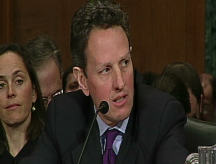Senate confirms Geithner as Treasury Secretary
Lawmakers approve President Obama's pick to oversee response to financial crisis. Some Republicans object.
NEW YORK (CNNMoney.com) -- Senate lawmakers voted Monday to confirm Tim Geithner as the next Treasury secretary amid ongoing uncertainty about the nation's economic future.
Geithner, who will spearhead President Obama's response to the financial crisis that threatens to unravel economic growth around the globe, won approval by a vote of 60 to 34.
Following the vote, President Obama and Vice-President Biden went to the Treasury Department to immediately swear Geithner in.
"We are at a moment of maximum challenge for our economy and our country," said Geithner at the swearing in. "Our agenda is to move quickly to help [the president] do what the country asked [him] to do."
The quick move is a sign that the President, who originally hoped Geithner would be sworn in on Inauguration Day, wants to get his entire team in place to help sell the $825 billion economic stimulus plan.
Democrats on Capitol Hill had been pushing for a quick confirmation of Geithner, arguing that the threats facing the economy required immediate action.
Sen. Orrin Hatch, R-Utah, cited that rationale in a statement on the Senate floor Monday afternoon.
"I do not believe we have the luxury of leaving this nomination unfilled even another day," said Hatch, who was one of five Republicans to support Geithner's nomination last week when it came before the Senate Finance Committee. "You're not going to get a better person for this job."
Senate Majority Leader Harry Reid of Nevada warned Friday that Republicans "would not be very wise politically" to try to hold up the nomination, which last week won the support of all the Democrats and half the Republicans on the finance committee. He added that Democrats could block any attempt to filibuster.
Despite Reid's comments, several Republican lawmakers made clear Monday that they had reservations about Geithner. Sens. Saxby Chambliss of Georgia, John Thune of South Dakota and James Inhofe of Oklahoma questioned Geithner's character in light of his failure to pay some taxes earlier this decade, and his handling of questions about those missteps.
"I don't believe he has been remotely forthcoming," said Inhofe.
Amid mounting Republican opposition to the plan, Obama is planning to ramp up his sales pitch Tuesday with a trip to Capitol Hill to meet with House and Senate Republicans in separate meetings.
Geithner will take over for Stuart A. Levey, the Under Secretary for terrorism and financial intelligence, who has been serving as acting Treasury Secretary since the Obama administration took office last week.
On Thursday, the committee recommended in an 18-5 vote that the full Senate confirm the appointment of Geithner, who was president of the Federal Reserve Bank of New York, to succeed Henry Paulson. Supporters spoke highly of Geithner's experience in managing financial emergencies.
The finance panel's recommendation came after two hearings last week that were dominated by questions about how President Obama and his top advisers plan to address the troubles in the financial sector.
Shares of big U.S. banks have plunged anew this month as investors struggle to come to grips with the risk that financial institutions will be overwhelmed by rising loan losses as the economy slows -- and the possibility that shareholders may be wiped out by a new round of government aid.
Congress has given Obama access to $350 billion of federal bailout funds. But congressional leaders, angered by the Bush administration's handling of the first slug of money under the Troubled Asset Relief Program, or TARP, have demanded that tough new terms be applied to bailout recipients -- and that the government give taxpayers a more complete account of how money is spent.
For his part, Geithner said in testimony last week that the administration is working on what he called a comprehensive response to the crisis. He said Obama would address the nation in coming weeks. Geithner also stressed the need for the government to act urgently and with great force.
"The tragic history of financial crises is a history of failures by governments to act with the speed and force commensurate with the severity of the crisis," Geithner said. "In a crisis of this magnitude, the most prudent course is the most forceful course."
Geithner also said he didn't yet see the need for more federal bailout funds, but stressed that the Treasury may have to "act flexibly" if conditions deteriorate further. The comments suggest the president may ask Congress for additional money beyond the $350 billion currently available under TARP.
Lawrence Summers, head of the National Economic Council, on Sunday wouldn't rule out the possibility that more money would be needed. "We can make important progress and get started with the support that has been provided," Summers said on NBC's "Meet the Press" when asked whether taxpayers should expect another request for funding to shore up the financial system. "What ultimately will be necessary is something that will play out over time."
Similarly, House Speaker Nancy Pelosi on Sunday said that "some increased investment" may be needed.
The five Republican committee members who opposed Geithner's nomination did so in part because of questions about Geithner's tax problems and whether he had candidly answered their inquiries about them.
Sen. Jon Kyl, R-Ariz., questioned Geithner extensively about the errors on his 2003 and 2004 tax returns and why Geithner didn't immediately pay back taxes due on his 2001 and 2002 returns.
Geithner acknowledged having made mistakes but insisted the errors were unintentional.
CNN's Ed Henry contributed to this report. ![]()



